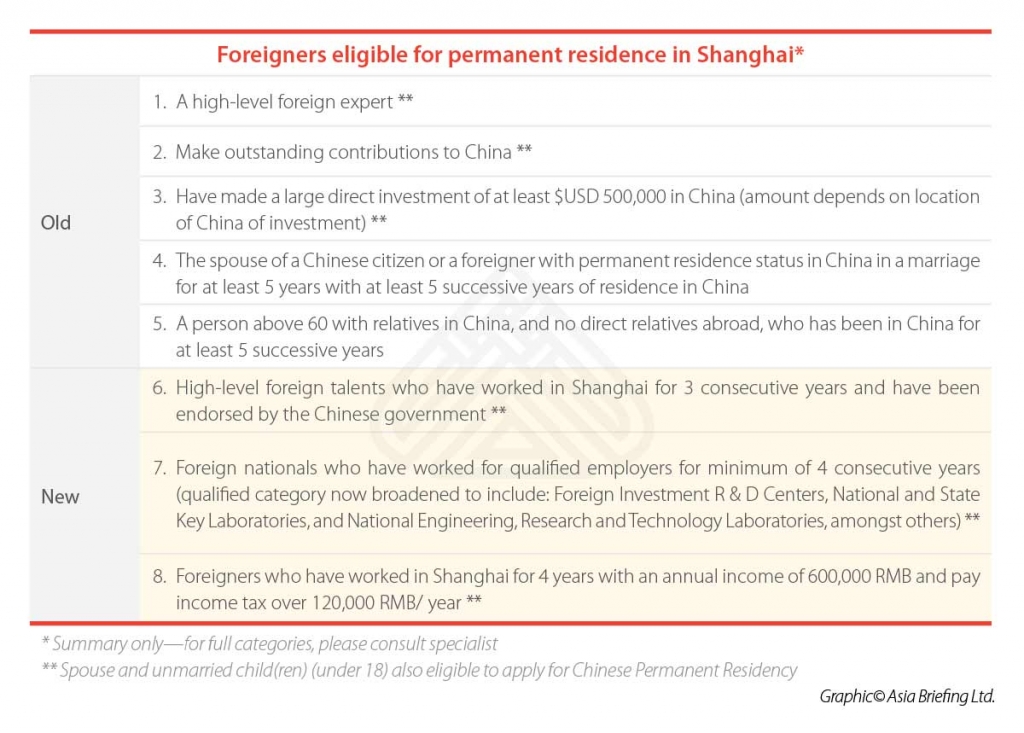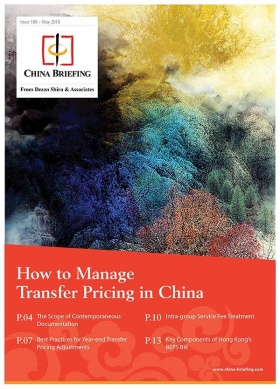The New Foreign Permanent Resident ID Card in China
By Dorcas Wong
Last July, the Ministry of Public Security started issuing a new generation of China’s Green Card. The new ‘Foreigner’s Permanent Resident Identity Card’ (FPRID) will gradually replace the old ‘Foreigner’s Permanent Residence Card’ (FPRC). While changes to the national legislation relate merely to the design and functionality of the card, cities like Shanghai and Beijing have adopted further policies that expand the eligibility criteria and shorten the overall application time.
The FPRID aims to ease the life of a foreigner in China, and is part of a series of larger reforms aimed at attracting innovative and entrepreneurial talent to China — such as a new national work permit categorization system for foreign employees.
Government officials quoted in the media said the FPRID is designed to provide foreign residents with increased functionality for their IDs, and give “a sense of belonging” in China.
China issued its first permanent residency permit in 2004. However, these permits have been notoriously difficult to obtain. The Ministry of Public Security records show that in the 10 years after the first permit was issued, only 7,356 foreigners were ultimately successful in obtaining permanent residency status.
Since 2015, the government has progressively introduced measures to ease the requirements of obtaining such a permit. As a result, the authorities granted 1,576 permits in the following year in 2016 —a 163 per cent increase from the previous year.
National implementation
The Ministry of Public Security announced that the changes to the new FPRID pertain mainly to the card’s operation and design — conditions and channels for applying for the permanent residence permit remain largely the same.
The new cards now closely imitate the second generation of Chinese National ID Cards and are embedded with a chip that holds the foreigner’s identity information.
The first generation FPRC cards enable the holder to stay in China for an unlimited period of time and permit a holder to enter and leave the country without any visa requirements.
However, this second generation FPRID cards now have additional functions that allow them to be more frequently used through the daily life of a foreigner.
Now a recognized form of identification, foreign residents can use this new card for transactions relating to finance, healthcare, education, transport, telecommunications, tax, social security, property registration, and legal services.
![]() RELATED: HR and Payroll in China: Eight Quick Tips That Can Make a Difference
RELATED: HR and Payroll in China: Eight Quick Tips That Can Make a Difference
Provincial implementation
Some regions – such as Shanghai, Beijing, Chongqing, and Guangdong – have adopted further measures to streamline the eligibility and process of applying for permanent residency. Shanghai was the first city to implement new measures, with the other cities largely mirroring these changes with slight variations.
In 2015, Shanghai expanded its eligibility criteria to include five additional categories of foreigners who meet a certain threshold of expertise or income level. In addition, it also shortened the initial FPRID application duration from 180 days to 90 days — easing access to China’s green cards as part of a larger scheme to become a world-class sci-tech innovation hub.
In 2016, the Shanghai Municipal Human Resources and Social Security Bureau implemented new legislation allowing FPRID holders to apply directly for a ‘Shanghai Overseas Talent Residence Permit.’
Pursuant to the Administrative Measure of Shanghai Municipality on Overseas Talent Residence Permit (Hu Fu Fa [2015] No. 32), a holder of this permit enjoys benefits like a residential permit, establishment of enterprise, employment by administrative authorities, social security, public education for children, and access to a driver’s license.
As a result of these new measures, the amount of permanent residence applications increased by 600 percent from 2015 to 2016.
Disparate progress
Human resource (HR) professionals note that the FPRID has generally eased administrative issues for foreign nationals. According to Fuki Fu, Assistant Manager of the Human Resources team at Dezan Shira & Associates, “The new FPRID offers many benefits to foreigners, allowing them to enter and depart China without the time restrictions that are typically associated with holding visas.”
However, these reforms have been inconsistently applied across the nation, and benefits are only able to be reaped by a select few. Currently, the policies adopted by large cities such as Shanghai, Beijing, Guangzhou, and Chongqing, concentrate on assisting senior-level, wealthy foreigners in the STEM industries (science, technology, engineering, manufacturing) and disregard many young talents that are looking to develop China’s knowledge or service-led economy.
![]() HR and Payroll Services at Dezan Shira & Associates
HR and Payroll Services at Dezan Shira & Associates
The focus on senior level talent perhaps demonstrates some short-sightedness on the Chinese Government’s behalf.
While these reforms are indeed a step in the right direction, more should be done to capitalize on young talent coming to China. Both the local and national government bureaus should continue opening up their eligibility criteria and invest in talented junior to mid-level employees who will ultimately be the future driving force behind China’s dream of becoming a science and technology world power.
Nonetheless, the transparent implementation of the FPRID in Shanghai, Beijing, Chongqing, and Guangdong means that employers in these locations should carefully review the scheme for their foreign employees. Professional advisors can help ensure the process is managed efficiently, and dialogue with officials in locations that may still be implementing national legislation.
About Us
China Briefing is published by Asia Briefing, a subsidiary of Dezan Shira & Associates. We produce material for foreign investors throughout Asia, including ASEAN, India, Indonesia, Russia, the Silk Road, and Vietnam. For editorial matters please contact us here, and for a complimentary subscription to our products, please click here.
Dezan Shira & Associates is a full service practice in China, providing business intelligence, due diligence, legal, tax, accounting, IT, HR, payroll, and advisory services throughout the China and Asian region. For assistance with China business issues or investments into China, please contact us at china@dezshira.com or visit us at www.dezshira.com
- Previous Article China Slashes Import Tariffs on Consumer Goods
- Next Article The Yangtze River Delta Integration Plan







